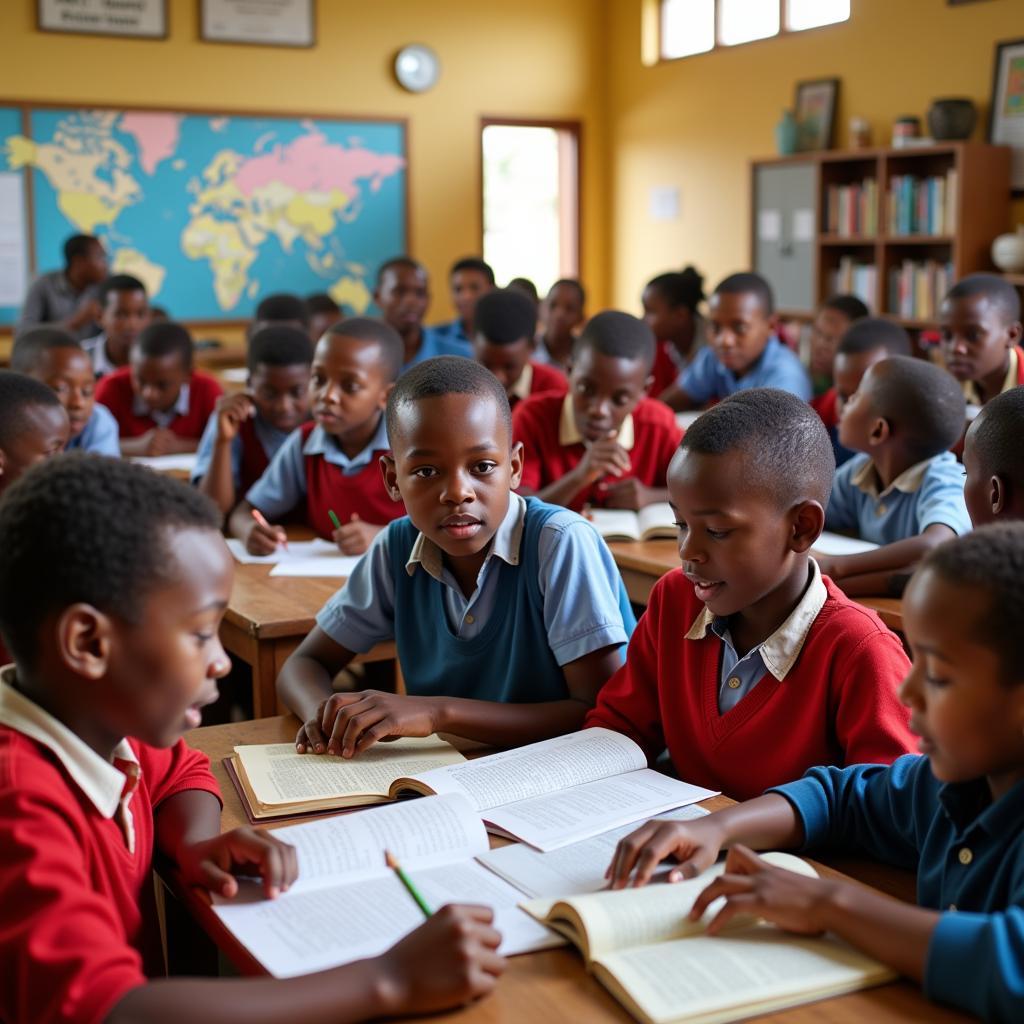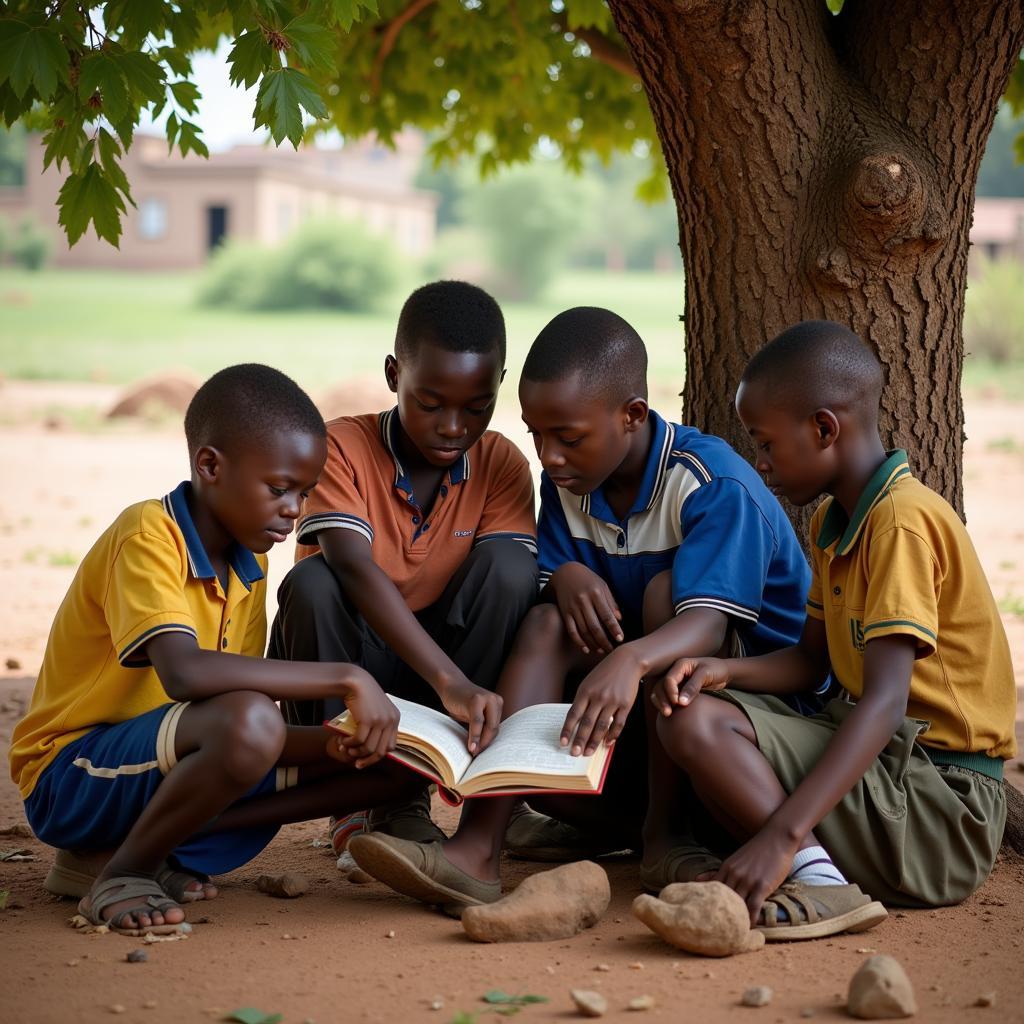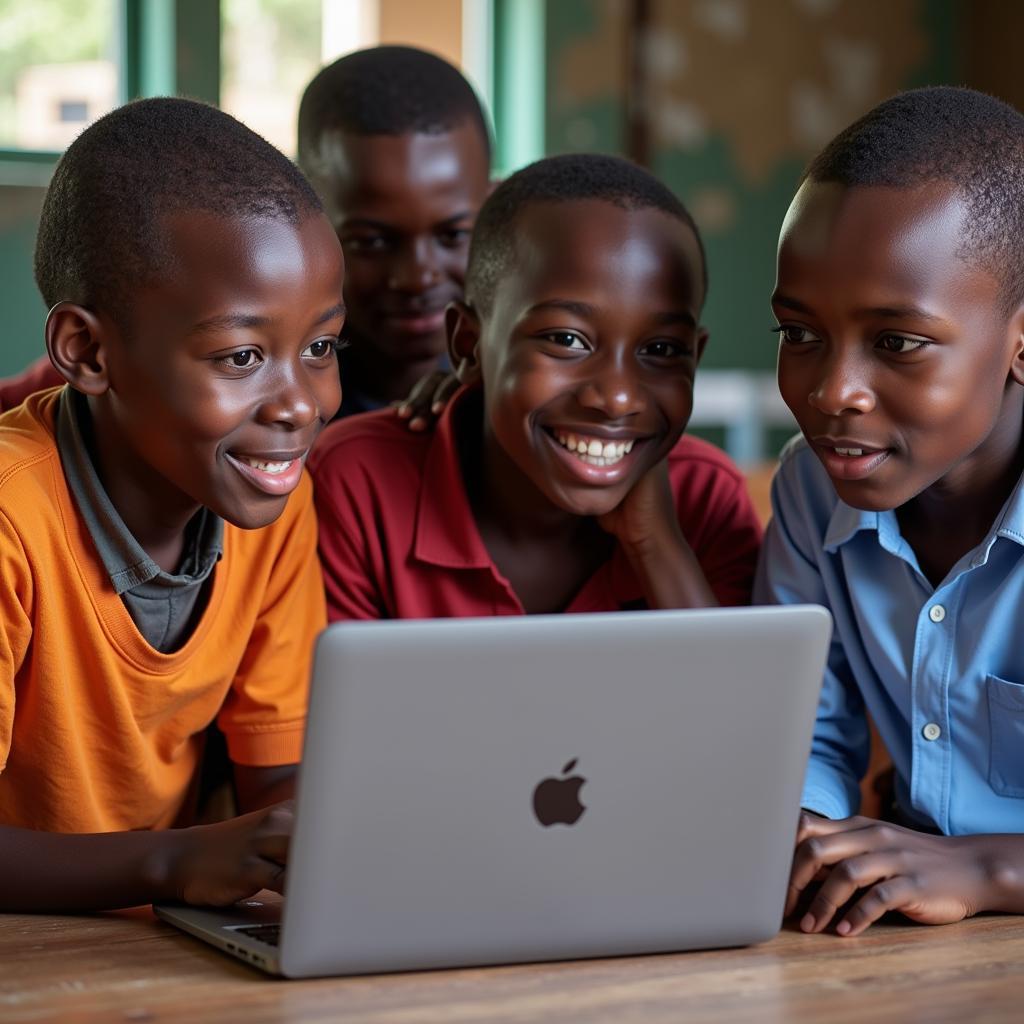African Boys Studying: A Path to a Brighter Future
African Boys Studying are a vital part of the continent’s future. Their education is not just about individual growth but about community upliftment and the overall progress of Africa. Access to quality education empowers these young minds to become innovators, leaders, and problem-solvers, driving positive change in their communities and beyond. This article delves into the various aspects of education for African boys, the challenges they face, and the potential they hold.
Education is a fundamental human right, and yet, millions of African boys still lack access to quality learning opportunities. This disparity stems from a complex interplay of factors, including poverty, cultural norms, and inadequate infrastructure. In many rural areas, schools are scarce, poorly equipped, and often staffed by underqualified teachers. For nomadic communities, access to formal education is even more challenging.
One significant barrier is the economic hardship faced by many families. African boys studying at home may be more common due to the financial burden of school fees, uniforms, and supplies. This can force boys into child labor, hindering their educational pursuits and perpetuating the cycle of poverty. Furthermore, in some communities, cultural traditions prioritize boys’ involvement in herding or farming over their education, further limiting their opportunities.
The Importance of Education for African Boys
Education is the cornerstone of development, providing individuals with the knowledge and skills necessary to thrive in a rapidly changing world. For African boys, education is not merely a means to an end; it is a transformative force that empowers them to break free from the shackles of poverty, challenge traditional limitations, and shape a better future for themselves and their communities.
- Empowerment and Opportunity: Education equips African boys with the skills and knowledge needed to secure better employment opportunities, increasing their earning potential and contributing to economic growth.
- Critical Thinking and Problem-Solving: A quality education cultivates critical thinking and problem-solving skills, enabling young men to address the unique challenges faced by their communities, such as food security, access to clean water, and healthcare.
- Social Change and Gender Equality: Educated boys are more likely to challenge harmful traditional practices, promote gender equality, and foster peaceful and inclusive societies.
- Health and Well-being: Education empowers boys to make informed decisions about their health and well-being, leading to healthier lifestyles and improved overall quality of life.
 African boys learning in a classroom
African boys learning in a classroom
Overcoming the Challenges to Education
Despite the undeniable importance of education, many African boys still face significant obstacles in accessing quality learning. Addressing these challenges requires a multi-faceted approach involving governments, NGOs, communities, and individuals.
Financial Barriers
The cost of education can be prohibitive for many families. Scholarships, grants, and subsidized education programs are crucial in ensuring that all boys have the opportunity to attend school, regardless of their financial background.
Cultural Barriers
Challenging traditional beliefs that undervalue boys’ education requires community engagement and education. Promoting the benefits of education for boys and girls alike is essential for creating a cultural shift that prioritizes learning.
African boy African girl highlights the need for equal educational opportunities for both genders.
Infrastructure and Resources
Investing in building and equipping schools, training and supporting teachers, and providing access to educational materials is crucial for creating a conducive learning environment for African boys.
 African boys studying with limited resources
African boys studying with limited resources
Addressing Specific Needs
Recognizing and addressing the specific needs of vulnerable groups, such as boys from nomadic communities or those affected by conflict, is essential for ensuring inclusive education.
A quote from Dr. Abimbola Adebayo, a renowned education specialist in Nigeria, emphasizes this point: “Investing in education is investing in the future. When we educate our boys, we are empowering them to become agents of change, driving progress and prosperity for generations to come.”
Looking Ahead: The Future of African Boys Studying
The future of Africa rests on the shoulders of its youth. Investing in the education of African boys is not just a moral imperative but a strategic investment in the continent’s future. By providing them with the tools and opportunities they need to succeed, we unlock their potential to transform their communities and contribute to a brighter future for all. About African tribes costumes offers a glimpse into the rich cultural heritage that these boys carry.
Another expert, Mrs. Fatoumata Diallo, an educator from Senegal, emphasizes the role of technology: “Technology can bridge the educational gap in Africa. By leveraging digital learning platforms and online resources, we can expand access to quality education for boys in even the most remote areas.”
 African boys using technology for education
African boys using technology for education
Investing in African boys studying is an investment in the future of Africa. With access to quality education, these young men can become the driving force behind sustainable development, innovation, and positive social change.
FAQ
- What are the main challenges facing African boys’ education? Poverty, cultural norms, lack of infrastructure, and limited resources are significant challenges.
- Why is education important for African boys? Education empowers them to break the cycle of poverty, promote social change, and contribute to economic growth.
- How can we support African boys’ education? By investing in schools, teacher training, scholarships, and addressing cultural barriers.
- What role does technology play in African education? Technology can bridge the educational gap by providing access to online learning resources.
- What is the future of African boys’ education? With continued investment and support, the future holds immense potential for growth and positive change.
- What are some initiatives promoting African boys’ education? Numerous NGOs and government programs focus on providing scholarships, building schools, and promoting educational access.
- How can individuals contribute to this cause? Individuals can donate to organizations supporting African education, volunteer their time, or advocate for increased funding and resources.
For further information, you might be interested in African boys for Mary. We also have resources available on African forest peoples sex life videos.
If you need further assistance, please contact us at Phone Number: +255768904061, Email: [email protected] Or visit us at: Mbarali DC Mawindi, Kangaga, Tanzania. We have a 24/7 customer service team.